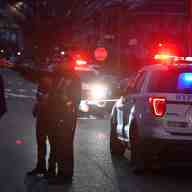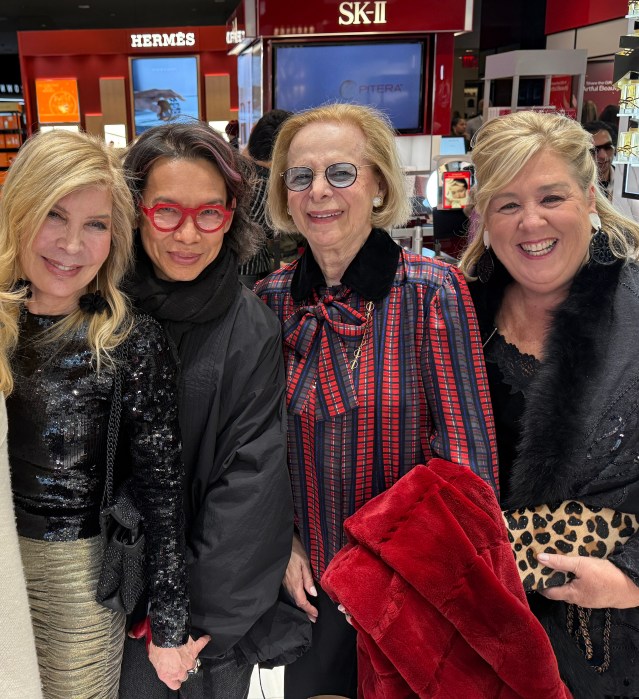By Lesley Sussman
You don’t have to do more than glance into the window of Moishe’s Bake Shop at 115 Second Ave. to know that this store is the real thing — the king of kosher bakeries in Manhattan.
You’ll see platters piled with traditional Jewish noshes like hamantashen, rugelach, mandelbrot, sugar kichels and chocolate babka, pastries baked the way your grandmother did before the Atkins Diet spoiled everything.
In fact, Moishe’s is the last of the authentic kosher bakeries still remaining in Downtown Manhattan where baking is done right on the premises.
It’s a Lower East Side institution that recently celebrated its 35th anniversary, but whose roots go back nearly 60 years when owner Moishe Perl’s father first got into the baking business after coming to America from a Nazi concentration camp.
Enter the doors of this hole-in-the-wall bakery at Second Ave. and Seventh St. and the clock turns back to a time when this was a predominantly Jewish, Ukrainian and Polish neighborhood — long before the faddish bars, restaurants and N.Y.U. students did a takeover of the area.
In this homey and unpretentious atmosphere which once typified many post-World War II shops run by immigrants on the Lower East Side, two glass showcases feature an eclectic variety of traditional Jewish goodies — from cookies to Moishe’s world-famous hamantashen, a triangular-shaped pastry usually with poppy-seed, raspberry, prune or apricot filling. Shelves lining the walls are filled with freshly baked breads from pumpernickels to corn rye.
Thursdays are a special day at Moishe’s when the potatonik — a crunchy cross between kugel and potato bread — comes piping hot out of the oven and people turn up from all five boroughs to purchase a couple of loaves of this to-die-for treat.
On a recent afternoon Moishe, wearing an open-collared white shirt and black skullcap on his head, was seated in his cramped office in the rear of the bakery. Nearby, a machine rolled out dough that would be used to bake challah, the traditional Sabbath bread.
When Moishe isn’t busy on the phone — which he always seems to be — or occupied with baking, he can be found chatting in his Yiddish-accented English with his loyal customers, asking them about their business, family and health.
Right at that moment, the bearded baker with the mien of an Old Testament figure was reminiscing about that time in 1972 when he first opened his bakery here.
“It was a slum neighborhood,” he recalled. “The homeless were sleeping on the street and the Second Avenue subway was under construction.
“From Eighth Street down to Houston there was maybe three stores open. Everything was closed down. You were able to get any sized store for $75 a month — landlords were begging you.”
Moishe was operating a small bakery at Houston and Orchard Sts. at the time when he received a call from the family who owned his present store.
“This was a bakery for over 80 years and the owner had died,” he recalled. “The estate came to me and asked me if I wanted to take over the building — they said everything in the bakery was fully equipped. They gave me a very good deal, so I accepted the offer.”
Back then, Moishe added, there were many Jews living in this neighborhood, along with Ukrainians and Poles, so he thought the move to Second Ave. would be a good one for him.
That proved to be true. Even today, while the neighborhood demographics have dramatically changed along with the rents, business has not.
“It hasn’t slowed down things at all,” Moishe said, a broad smile on his face — and the customers waiting for orders up front were proof of that.
“Everyone comes in here: Christians, Jews — you name it,” he said. “And I haven’t changed one thing from the way I’ve baked over the years. Everything is strictly kosher and I only use ingredients that I would eat at home. It’s all baked from a European tradition and all the merchandise is nondairy, except for the cheese Danish.”
Moishe emphasized, “Anyone who comes in here will still see a bakery the way it was 37 years ago. When it’s gone it’s gone. I think that’s why people appreciate us very much.”
The son of Holocaust survivors — one of nine children — Moishe will only admit to being “somewhere between 50 and 60.” Like his parents, he has nine children of his own — all of whom are married.
“My youngest daughter was just married three weeks ago,” he said proudly. The baker also boasts more than 30 grandchildren.
Baking runs in the family, the Williamsburg resident said. His father, after arriving in America from Romania in 1947, began to work in a bakery on Suffolk St.
“He worked there because a friend of his from Europe who knew how to bake called him in to help,” Moishe explained.
When some years later the city began to demolish buildings to make way for housing projects, the Suffolk St. bakery closed. His father eventually ended up in a business buying and selling baked goods. Meanwhile, Moishe, in 1969, bought his first bakery at Houston and Orchard. Why? The baker smiled and shrugged his shoulders.
“I don’t know. It just happened that I became a baker,” he said. “It was predestined. This is what God wanted me to do.”
Despite the horrors of the Holocaust, Moishe said both his parents — who met in a U.S.-supported German rehabilitation camp after the war — never lost their strong faith in God. He grew up in a strictly Orthodox household.
“Even today, come rain or shine, the lights are off and the doors to the bakery are locked Friday nights and Saturday for the Sabbath,” he said.
Moishe added that despite the Holocaust, his father “always thanked God that he and my mother were still alive, even though they went through some very hard times. He weighed 47 pounds after the war before he started eating again.”
Moishe said he was conceived in that camp, and that his mother was pregnant with him when she and his father made their three-month boat voyage to America.
“When she finally arrived in New York City she was six months pregnant. She dropped me off here,” he said.
Getting back to business, Moishe noted, “My schedule is no schedule. It’s a 24-hour-a-day schedule. Every day there’s something else. One day the elevator breaks, one day the mixer breaks, one day somebody is sick, one day this, one day that — that’s why I have no schedule.”
As if running a bakery doesn’t keep him busy enough, Moishe is also a psychologist with a rabbinical degree in counseling. In his spare time he does family counseling for the Hasidic community free of charge.
“I help out with family disputes, business disputes, mediation — things like that,” he explained. “I’ve been doing it as a volunteer for more than 30 years. I think that’s my biggest accomplishment in life.”
After all these years, what does Moishe enjoy the most about the bakery? He laughed at the question.
“When the customers are happy, the merchandise comes out nice — and it’s busy.”
































